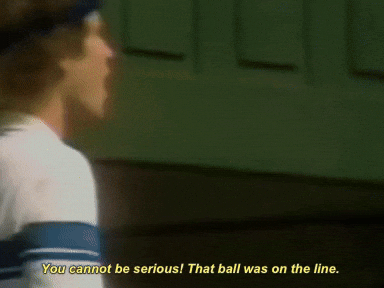Why Does Losing Make Me So Angry?
Introduction
There are 3 kinds of people in this world.
You’ll see what I’m saying.
Some people just aren’t all that competitive. These people tend to do things they enjoy, without much consideration to “beating others” or “winning”.
Then there’s the majority. Sure, they enjoy winning, they want to win, but it’s not like it’s the be all and end all. They can move past failure and laugh off their mistakes, generally speaking.
Finally, there’s those guys.
I’m talking about the people who really cannot stand losing in any context. It always feels unacceptable to them. It makes them furious.

What is this? Why can most people take a loss on the chin no problem, whilst others really cannot tolerate defeat even a little?
I wanted to find out what was behind this phenomenon, so I dove into the research.
Hopefully, what I have learned will help you to understand your own anger and live in a more balanced and conscious way.
Why does losing make me so angry?
For us to understand why losing causes anger, we must first determine what anger is when you boil it down.
Wherever there is anger, there is first pain. Anger is a reaction to, or an interpretation of, feeling some pain.
The pain though, in and of itself, is not enough. For you to feel anger, you must have judged the pain you are feeling in some way.
You have decided (consciously or unconsciously) that this pain means something, or made an assumption about exactly what this pain is telling you about the world.
There is a quote by the Buddha, which hits this distinction absolutely on the nose.
“Pain in life is inevitable, but suffering is not. Pain is what the world does to you, suffering is what you do to yourself. (By the way you think about the “pain” you receive). Pain is inevitable, suffering is optional”.
The anger that you feel when you lose, is a part of the suffering that the Buddha describes.
Let’s look at an example to see how this all works.

Say you are a runner, and you finish 4th in a race that you had your eyes on winning.
Due to the expectation of victory, a level of pain is inevitable. It never feels good to come up short.
For your experience of pain to develop into anger, you would have to judge that pain in some way.
Maybe you would decide that the result indicates you didn’t work hard enough, and you let yourself down.
Maybe you would decide that you were not training optimally, and your coach held you back from success.
Maybe other runners cheated. Maybe the weather changed unexpectedly and the world is unfair. Maybe the result means that you cannot achieve your ambitious goals in the future.
Whilst these assumptions can motivate change and be beneficial in some cases, oftentimes someone who cannot tolerate losing full stop, has learned to make all kinds of wild assumptions around the pain that they feel to try to make sense of their discomfort.
They do this, more often than not, in a way that is subconscious and uncontrolled.
This is great news-
Once you can learn to distinguish between pain and anger, you can start to live more consciously and exert more control over the emotions that you feel.
The solution to anger- avoid judging the pain that you feel

If anger is just pain that has been transformed through assumptions and judgment, then it follows that we can reduce how often we become angry by learning to draw a line between the pain stimulus and our anger response.
Feeling pain makes you angry, which influences your decisions. But, with some practice, feeling pain can literally just be feeling pain.
You can feel the pain consciously, avoid anger, and make your own decisions from a far healthier place.
This is where meditation can be seriously beneficial.
I know. I’m skeptical as well. I get that it all sounds absolutely batsh*t. Let’s give it a chance though ok, 300 million people can’t all be full of it?
In meditation, you are told to become mindful of emotions as they arise. When you are happy, you notice yourself Feeling happy. When you are anxious, you notice yourself feeling anxious.
This is powerful because in order to acknowledge feeling the pain, you have to step beyond the pain itself.
What is it that notices the pain?
In simple terms, The practice of meditation is the practice of separating your own stream of consciousness (your “self”) from the pain that you feel, and the influences of the environment you are in.
How anger can benefit you if you know how to use it
I’ve spent most of this article so far talking about how you would go about avoiding becoming angry. In most circumstances, this is sound advice.
But when you are going about controlling your own rage, make sure you don’t throw it out altogether.
Anger, in a select few circumstances, is just the thing you need to feel to make the most out of your situation. Let’s look at a few of these instances.
Read also: Let everyone else call your idea crazy
Anger can motivate you to change yourself

Feeling pain is never fun for any reason. Sometimes you work hard, you do your best, you spend yourself, and it isn’t enough.
Sometimes, though, you feel anger because you let yourself down.
Maybe you lost that race because you weren’t ready. But maybe you cut corners in your training and you know it.
Maybe you lost your job for reasons outside of your control. But maybe you got lazy and complacent.
In times like these, maybe a little bit of anger is just what you need.
Anger can make you focused and determined
A little anger will stop you from settling for second best. It will drive you to change. It will call you to take control of a situation.
It isn’t that we shouldn’t get angry; rather, it is that we should choose when we are angry and be able to keep it under our control.
“The greatest players use anger as fuel. Michael Jordan played every night with something like road rage.”
J.R. Moehringer
I’ve felt this in my own life as a professional chef. Those hard services, where there is way too much going on and everyone is in way over their heads- That is when you will see everyone in the kitchen at their absolute sharpest.
People are clearly pissed, but they are also focused and determined to rise to the occasion.
Your anger could be telling you something
This one is personal to me.
For whatever reason, once in a blue moon, I find myself absolutely furious.
Picture it.
I’m good, my friends are good, my job’s going well, money’s fine, family’s happy.
I wake up one morning and I’m really bloody angry.
As I go about my day, the smallest problems infuriate me. They seem absolutely unacceptable.
At first, I thought this meant I was angry by nature- that I had to work on controlling my anger and being more positive to people around me.
But after a whole lot of confusion, I now know better.
When this happens, it usually means that there is something about my life that troubles me, that I have refused to address.
Once it happened, and I figured out that I needed to try and get back with my ex because deep down I knew that other girls were doing nothing for me.
Another time, I figured out that the career path I was on was not leading me to a place that I would be proud of long term. I had to do something to give myself a chance of real success.
Another time, I stopped exercising for a while in order to push other parts of my life forward. I thought I could save time by doing this, but my body and mind was suffering and I learned that without exercise, I was weak and fragile mentally.
All of these nuggets of wisdom took me days to figure out. And they all started with an unexplainable, persistent rage.
I have a feeling that most people aren’t quite this oblivious to their own emotions, but there must be someone else out there who hears what I’m saying!
Why losing is a part of winning

Get it through your little head – Winners lose!
The only people that do not make public mistakes are losers who are so scared of other people’s opinions that they never do anything remarkable.
So next time you lose, try to see it as a necessary component of pursuing real success, rather than something negative.
Losing, ultimately, is a part of winning. It’s a part of life as a whole. That being said, there are a few things that you can do to make sure that your losses do not stop you in your tracks.
Set controllable process oriented goals
This is a practical point about setting goals.
Lets say your goal is to write a bestseller.
In order for you to achieve this goal, there are factors outside of your control that would have to go your way.
So while it’s a perfectly specific and ambitious goal, it will be a stressful target to shoot for.
You can write a book that you are proud of, but how do you know people will want to read it?
You can learn about marketing and sales and publishing and put in the work to make your book sell, but how do you know what the concrete result of that will be?
For that same goal, check out these alternatives.
Write the best book that I am capable of writing in the next year on this topic.
Finish the first draft of the book in the next 6 months.
Finish 2 chapters in the next month
Write 2000 words of the book per day.
Although we are trying to ultimately accomplish the same thing in this second example, we have rephrased the goal to only consider the things that we can directly control.
This means that we can 100% determine whether we have succeeded or failed, day by day.
Study the lives of winners
When you look at great men like Phil Knight, Steve Jobs- really anyone that has reached that very top level- it’s so easy to feel as if they are different from us. Like they just operate on a whole other level, without distractions or failures or weakness.
This is why biographies and memoirs are such powerful tools for self development.
When you read more about these men, you learn all about the times when their lives look strangely familiar.
The times when they let themselves down. When they failed. When they thought something would be brilliant and it just wasn’t. When everyone around them struggled to see what they were doing with themselves.
If anything, people like this fail way more than people like us. And the stakes are so much higher for them.
Do yourself a favor, read about the lives of the people who really inspire you in life. You will learn that they took plenty of losses along the way, and that might help you come to terms with your own mistakes and shortcomings.
Great resources for people who struggle with their anger

When writing that last paragraph, Shoe Dog is the book that I had in mind. It is the full story of how Phil Knight created Nike, and its brilliance comes from just how unremarkable Phil Night seemed to be growing up.
This is not some great man- this is a normal man that pushed and pushed and pushed until he built something great.
I have the book on audible, and have used it to find inspiration many times over the years. Here is one of my favorite quotes from the book.
“So that morning in 1962 I told myself: let everyone else call your idea crazy…just keep going. Don’t stop. Don’t even think about stopping until you get there, and don’t give much thought to where “there” is. Whatever comes, just don’t stop.
That’s the precocious, prescient, urgent advice I managed to give myself, out of the blue, and somehow managed to take. Half a century later, I believe it’s the best advice- maybe the only advice- any of us should ever give.”






